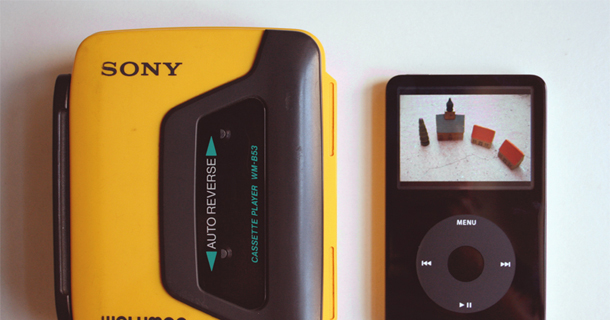
Apple’s increasingly restricting what consumers can do with their devices. Now those policies put the company in a battle for openness against the likes of Google.
It’s a competitive dilemma that comes from being in both the platform and the content business. And it’s one Apple should have handled better, because it’s the same mistake another company made that let Apple dominate the portable music market: Sony.
Years ago, Apple was criticized for being both a hardware company and a software company. The economics of the two businesses were so widely different that nobody could possibly succeed, according to common wisdom.
Yet Apple seldom follows common wisdom. Tight integration of OS, brand, and hardware made the Macbook a huge success. Even tighter integration gave us the iPod, then the iPhone. Because a phone’s not a computer — it has to be able to call an ambulance, for example — we accepted a less open platform.
While the PC industry fought over the separation of hardware and software, however, today’s battle is over the separation of platform and content. Amazon was slammed for retroactively removing books from its Kindle, and now Apple has pulled Google Voice from the phone.
Consider the Walkman — a groundbreaking product that no focus groups wanted. Sony built it anyway. Apple does the same thing, building things they think are awesome rather than listening to the huddled masses. The “Designed in Cupertino” badge on all Apple products clearly shows who’s calling the shots.
And yet Sony lost the portable player market. Why didn’t Sony invent the iPod?
Sony is both a hardware company and a content company. It owns music labels, film studios, and hardware. As a result, it’s been embroiled in all kinds of media debacles, from Betamax to DRM spyware to hopelessly unusable proprietary music formats. Apple’s iPod was hardly the first MP3 player — but it did play MP3s, and it was easy to use. While Sony’s management was stuck in a protected-content mindset, Apple was thumbing its nose at the music industry with cheeky “Rip, mix, burn” ads.
Now the tables have turned. By keeping Skype off the phone, or blocking Google Voice, or removing other audio players and readers, Cupertino can no longer hide behind claims of “ensuring phone reliability.” It’s protecting the interests of its partners (like AT&T). It’s protecting itself from competition for features it has yet to ship (like unified messaging). It’s safeguarding its footprint in content sales and distribution (iTunes.)
Unfortunately for Apple, legislators are paying attention. Regulators have limited US phone companies’ ability to act monopolistically — which is a good thing, since the Baby Bells have reassembled into just a few large carriers. Now they’re wondering whether the iPhone itself, and exclusive distribution agreements, are monopolistic. The Google Voice debacle will only hasten these investigations, and now Apple’s vocal proponents are becoming its strongest detractors, switching to unencumbered platforms like Google’s Android.
Apple could learn from Sony. Every time they restrict something, they play right into Google’s hands.
Image by Rosa Pomar







 @
@ Tags:
Tags: 


 Like all images on the site, the topic icons are based on images used under Creative Commons or in the public domain. Originals can be found from the following links. Thanks to
Like all images on the site, the topic icons are based on images used under Creative Commons or in the public domain. Originals can be found from the following links. Thanks to
Agreed on this.
However everybody forgets that just 2 years ago, nobody could install “apps” on a cell phone, and carriers like Bell or Rogers dictated what features we could use on a cell phone (mainly phone calls, sms, email and that’s it)
Apple did it, and now they are criticized publicly… I’m not even sure there’s a company that would innovate better than Apple.
[…] block Skype, location functions and streaming TV. The problem becomes much more noticeable when one company, like Apple, is both a platform and a service provider and co-develops features (like Visual Voicemail) with a single […]
[…] block Skype, location functions and streaming TV. The problem becomes much more noticeable when one company, like Apple, is both a platform and a service provider and co-develops features (like Visual Voicemail) with a single […]
Agreed on this.
However everybody forgets that just 2 years ago, nobody could install “apps” on a cell phone, and carriers like Bell or Rogers dictated what features we could use on a cell phone (mainly phone calls, sms, email and that's it)
Apple did it, and now they are criticized publicly… I'm not even sure there's a company that would innovate better than Apple.